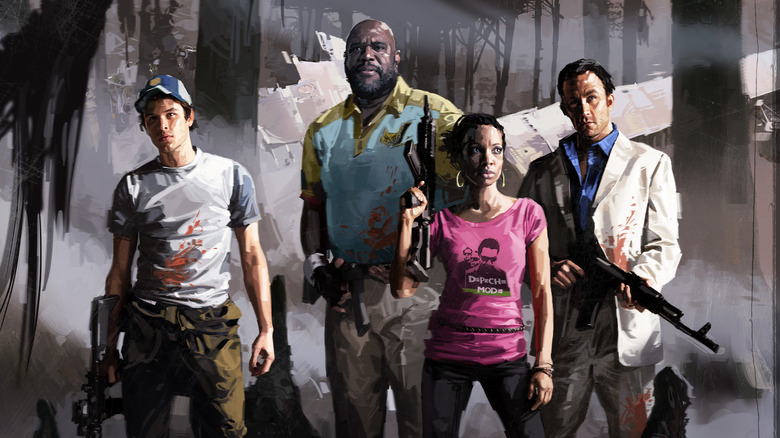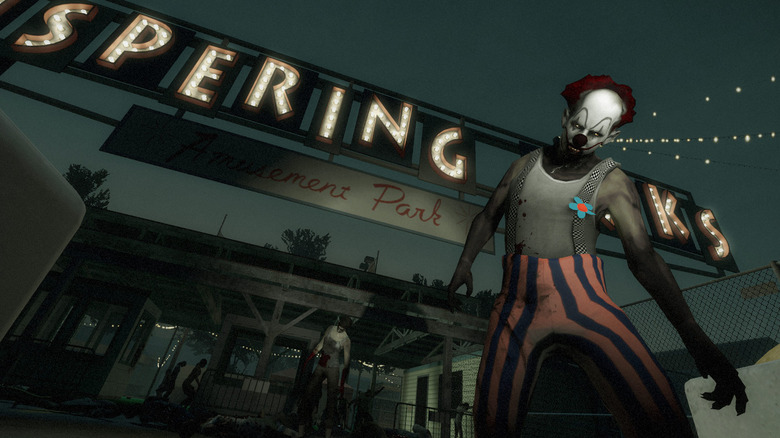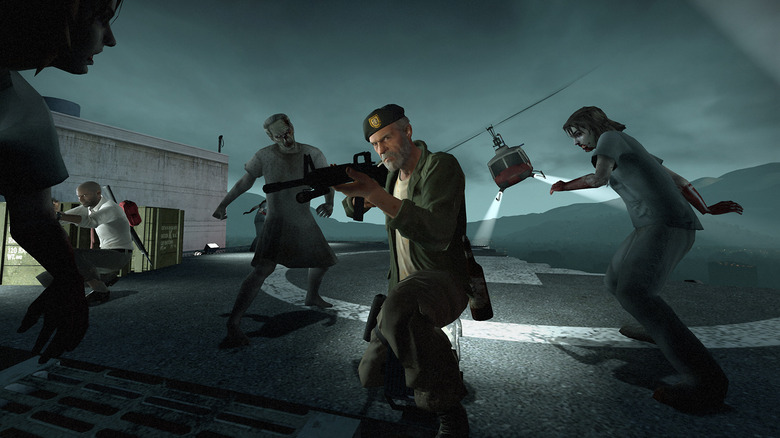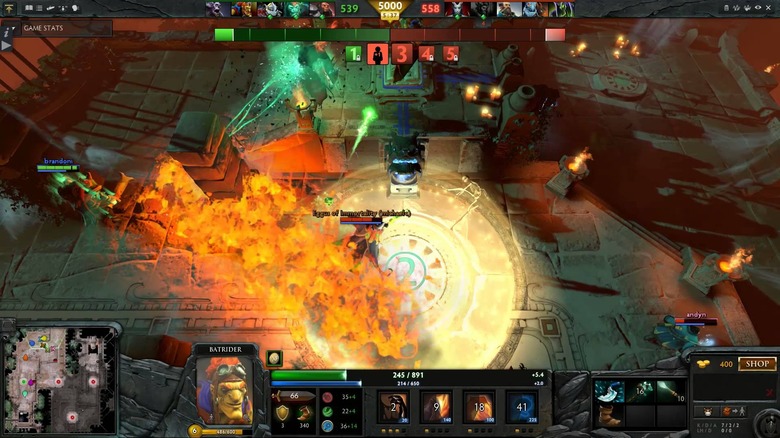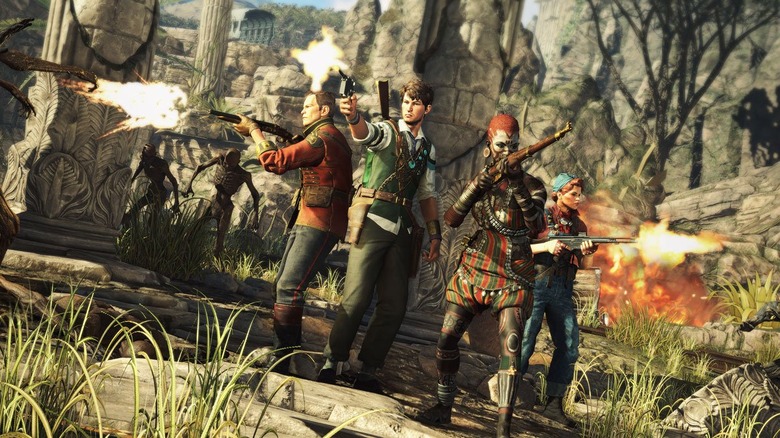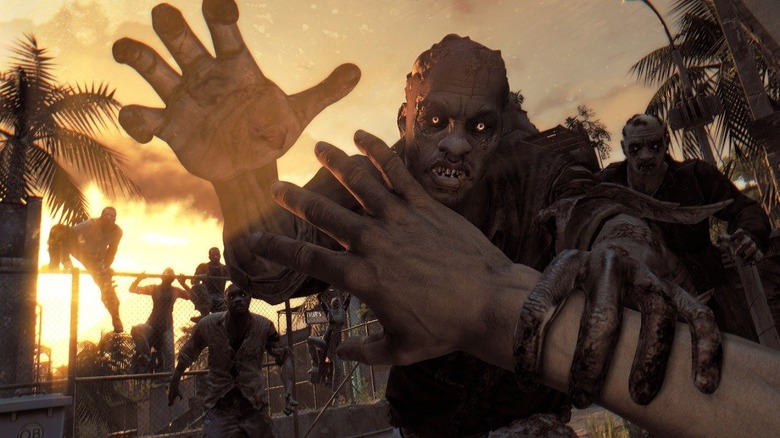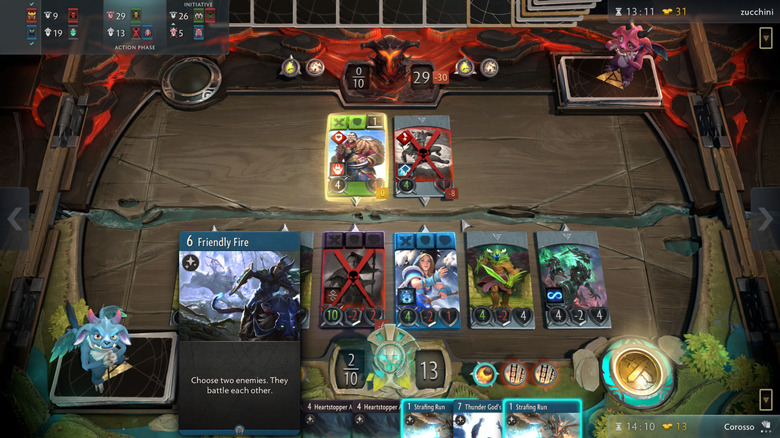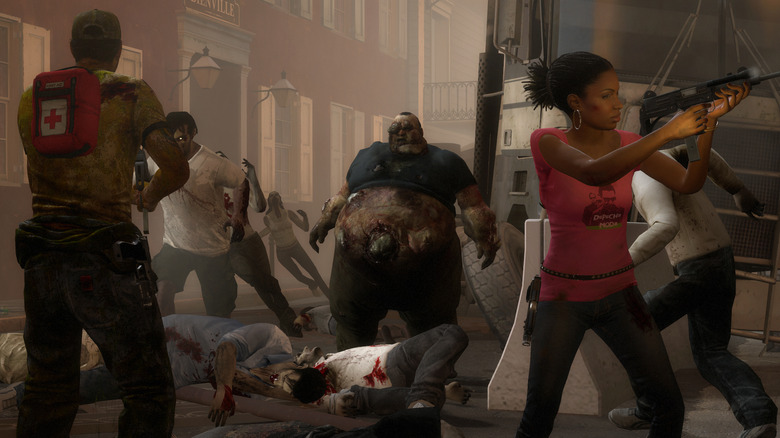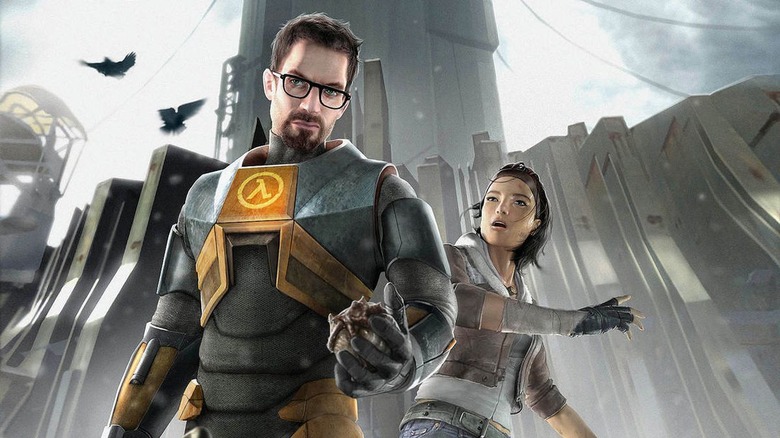Why Left 4 Dead 3 Will Never Happen
When looking back at Valve's impressive portfolio, most fans signal sci-fi first-person shooter Half-Life as the very best the studio has ever had to offer. But the truth is that, while the Half-Life series might be one of the company's peak accomplishments, it's only one of quite a few iconic properties. Valve is also responsible for the Portal games, Counter-Strike, Team Fortress 2, Dota 2, not to mention the Steam platform that makes the studio billions of dollars a year.
Then there's the little zombie game that could: Left 4 Dead, one of a few projects on Valve's roster not originally conceived by the developer. It was Turtle Rock Studios, who you might also know for the asymmetrical 4v1 monster shooter Evolve, who first came up with the idea for Left 4 Dead while working on Counter-Strike: Source for Valve. The game was originally planned as a mod for Counter-Strike called Terror, but Turtle Rock decided to take the idea even further after watching zombie film 28 Days Later, choosing instead to create an original title.
Left 4 Dead was officially announced in 2006 and Turtle Rock was acquired by Valve in 2008. The rest is gruesome, zombie-killing history. A sequel, Left 4 Dead 2, arrived in 2009, only a year after the original.
Unfortunately, we've not heard much about the series since. Will Left 4 Dead 3 ever arrive? Here are a few reasons Valve will probably never return to the franchise.
The Left 4 Dead franchise isn't as popular anymore
The Left 4 Dead franchise has been a sales success for Valve. By 2012, the series had sold more than 12 million copies, according to former Valve writer Chet Faliszek. But that was six years ago. While Valve hasn't released exactly how many copies of the games it's sold since 2012, you can see a slow decline in popularity in terms of concurrent players still shooting zombies on Steam.
At the time of writing, Left 4 Dead 2 occupies 61st spot with a little over 7,600 current players on Steam Charts' list of games with the most concurrent players. The first Left 4 Dead is not even in the top 100. While being in the top 100 is nothing to scoff at, there is a very steep climb between Left 4 Dead's humble player count and number one spot holder (as of this writing) Dota 2's 300,000 players.
Needless to say, while 7,600 current players is an impressive number when you consider that Left 4 Dead 2 has been out for almost ten years, it's probably not enough to convince Valve to greenlight another sequel at this point.
Valve doesn't make sequels unless it has a good reason
Either way, popularity has never been enough to send Valve into a development frenzy. If Valve had listened to all the fans who have begged for Half-Life 3 over the years, we'd probably be on Half-Life 7 by now. Valve doesn't seem to care whether a franchise is still in the public consciousness (although it probably does help a little) or not. Indeed, after all those years of the internet making noise about the elusive Half-Life 3, the game has never really even existed at the studio beyond a few false starts.
So, even if fans were about to knock Valve president Gabe Newell's door down with requests for Left 4 Dead 3, it could very well mean nothing to the studio. According to Newell, while talking to Geoff Keighley in a podcast in 2015 (via Polygon), Valve would need a very good reason to revisit one of its old franchises.
"The only reason we'd go back and do like a super classic kind of product is if a whole bunch of people just internally at Valve said they wanted to do it and had a reasonable explanation for why [they did]," Newell explained.
Justifying a new entry series that hasn't had a new installment in almost a decade might be too difficult.
Steam makes so much money that Valve doesn't need to make new games
Valve, once a software powerhouse with some of the biggest franchises in gaming, isn't really known for game development anymore. Instead, the company's focus has largely moved to Steam, the digital gaming platform that has become synonymous with PC gaming. As one of the big digital gaming marketplaces on the internet, Steam is a huge source of revenue for the company.
According to Sergey Galyonkin, creator of now-defunct Steam watchdog site SteamSpy, the platform raked in $4.3 billion in 2017. Galyonkin said much of that success was due to PlayerUnknown's Battlegrounds, which made $600 million on the platform, while Counter-Strike: Global Offensive, a Valve game, made $120 million. With sales numbers like that, it's really no wonder Valve has focused its efforts on maintaining the Steam platform.
Without much incentive to make its own games, Left 4 Dead 3 is unlikely to be the game to change Valve's mind.
There are already too many team-based co-op shooters on the market
Another reason Valve might not be into exploring a new Left 4 Dead sequel is that there are already too many similar games on the market. When the first Left 4 Dead launched in 2008, it arrived at the advent of four-player co-op PvE shooters and there wasn't that much like it on consoles, except Call of Duty: World at War's Nazi Zombies mode and Gears of War 2's Horde mode. Plenty of other Horde modes and cooperative PvE shooters followed in Left 4 Dead's footsteps, though.
Today, there are so many co-op shooters to choose from that they might be deterring Valve from trying to penetrate a saturated genre. Not only does Call of Duty still release yearly Zombies modes, but games like Strange Brigade, Earthfall, and Warhammer: Vermintide 2 have added new spins on the gameplay Left 4 Dead helped popularize. These days, a new Left 4 Dead would have to bring something new to the table to stand out. That seems like more of an effort than Valve would be willing to make considering it doesn't even need to make new games.
The zombie genre is saturated in general
That's not even taking into account the sheer number of zombie games currently out or on the way. In 2008, there weren't many games that let you jump into a zombie apocalypse and blast or cut your way through the undead with your choice of weapon. Today, zombie games are pretty par for the course. In fact, thanks to the Call of Duty franchise, there's basically a new zombie experience on the market every year. And that's just one mode in a larger franchise.
There are full games dedicated to fighting zombies these days. Dying Light, the zombie game that also features parkour mechanics, has been a notable success, selling over 13 million copies as of February 2018. A sequel, Dying Light 2, is on the way as well.
World War Z and Overkill's The Walking Dead are also bringing popular zombie universes to consoles and PC in the near future. Both titles feature four-player team-based co-op gameplay similar to Left 4 Dead. Meanwhile, Days Gone is one of the PlayStation 4's big exclusives next year.
Left 4 Dead 3 would be facing some serious competition if Valve decided to make the game. Why bother on a game you're not even sure will be able to hold the players' attention with so many other options out there?
Valve would rather make new games based on current popular trends
While it's true that the developer might not be interested in jumping into a genre saturated with titles, it has followed popular trends when deciding what games to make.
MOBAs, for example, became tremendously popular in the late 2000s, thanks to League of Legends, which was itself inspired by a mod called Defense of the Ancients for Warcraft 3: Reign of Chaos. If the popularity of League of Legends wasn't enough to convince Valve to get in on the MOBA business while it was hot, the $624 million Riot Games made in 2013 definitely did. That same year, Valve launched Dota 2, a sequel to Defense of the Ancients, after two years of beta testing.
Valve followed a similar pattern VR. The company released its first VR experience, The Lab, in 2016 to coincide with the launch of the HTC Vive headset. In 2017, the company announced that it was working on three VR games, further showing its interest in adopting the popular gaming tech. These days, the studio is even developing its own VR controllers.
Most recently, Valve has turned its eye toward the popular CCG genre, which is currently dominated by Hearthstone. Valve will release Artifact in November.
Long story short, Valve likes to strike while the iron's hot on a new trend. Team-based co-op zombie shooters are old news and not worth the company's efforts.
Valve has more lucrative titles to work on
It's not only Steam keeping Valve from developing another Left 4 Dead game, but the fact that the company has already released a few online titles that have continued to rake in tons of money, thanks to live services and microtransactions. For example, Counter-Strike: Global Offensive, a game that was released in 2012 and is showing its age in terms of its graphics, made $120 million for Valve in 2017, according Sergey Galyonkin. With profits like that, it would make way more sense for Valve to continue to work on a game it's already released and is making tons of money on instead of a brand-new title.
"Longevity" is the keyword here. With Counter-Strike: Global Offensive and Dota 2, not to mention the upcoming online CCG Artifact, Valve has a list of games that can be regularly updated for the foreseeable future, with plenty of opportunities to charge players more money for additional content, whether it be new skins, heroes, or card packs.
The Left 4 Dead series, on the other hand, has never followed the "games as a service" model. For all intents and purposes, it's a linear gaming experience with a multiplayer component that isn't likely to keep you playing and buying additional content. If Valve did decide to make Left 4 Dead 3, the studio would likely have to transform it into a "service" game, which seems like time and money the company could just spend on further maintaining Counter-Strike and Dota 2.
Valve is allergic to the number 3
While there's nothing in the Valve handbook that actually states that the company doesn't do threequels, it's hard not to notice that the studio is at least a tiny bit opposed to making third entries. We're not just talking about Left 4 Dead 3 here. Valve hasn't made Dota 3 (because Dota 2 is still going strong), Team Fortress 3, Portal 3, or the mythical Half-Life 3.
Surely, there's money to be made with any of these sequels. Portal 2, for example, had sold more than 4 million units by 2012, just a year after its launch, according to Eurogamer. Most publishers would take that success and spin it into a third entry and perhaps even a fourth. But not Valve. Because it's allergic to the number 3.
If there's any chance of Left 4 Dead 3 ever seeing the light of day, it'll have to contend against Valve's long history of ignoring threequels. But don't bet on it.

